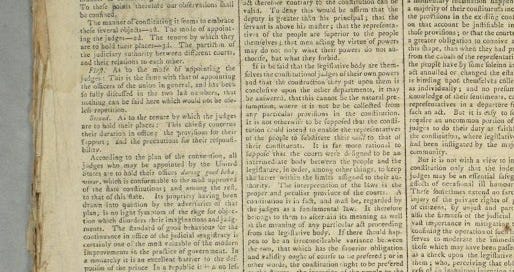Bonus 98: The "Least Dangerous" Branch—Court Reform and Federalist 78
An increasingly common objection to even modest proposals for Supreme Court reform is that they would infringe upon judicial independence. Alexander Hamilton would've disagreed.
Welcome back to the weekly bonus content for “One First.” Although Monday’s regular newsletter will remain free for as long as I’m able to do this, much of the bonus content is behind a paywall as an added incentive for those who are willing and able to support the work that goes into putting this newsletter together every week. I’m grateful to those of you who are already paid subscribers, and hope that those of you who aren’t will consider a paid subscription if and when your circumstances permit:
For this week’s bonus issue, I thought I’d take a minute to tie current debates over Supreme Court reform back to Founding-era debates about the role of the federal courts—the “independence” of which was one of the most significant innovations to come out of the Constitutional Convention. As the contemporary Court’s defenders have begun to push back more aggressively against calls for even the most modest reforms, one of their central charges has been that virtually any reform (even those involving more oversight by judges) would infringe upon the Court’s (and the courts’) “independence.”
Somewhere along the way—whether in high school, college, or for the lawyers out there, law school, you probably read (or, at least, should have read) Federalist No. 78—Alexander Hamilton’s celebrated defense of both judicial review and judicial independence. It turns out, though, that Hamilton understood the very point that is lost on so many of today’s reform critics: independence was not, and was never meant to be, a form of isolationism. Even an “independent” judiciary is, and ought to be, heavily dependent upon the other branches of government to do their job. And although the conclusion may seem counterintuitive, that involvement has the effect of facilitating judicial independence—not undermining it.
For those who are not paid subscribers, the next free installment of the newsletter will drop on Monday morning. For those who are, please read on.
Keep reading with a 7-day free trial
Subscribe to One First to keep reading this post and get 7 days of free access to the full post archives.




